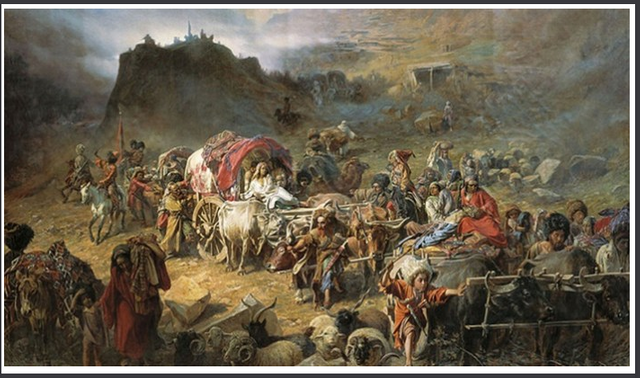Death and Exile in the Caucasus
Starting from 1567, after the surrender of Shamil, the 300-year Russian-Caucasian wars, which ended in 1864, continued at great intervals in great chime until 1920.
Especially after the surrender of Shamil and after the Ottoman Russian wars of 1877-1878 and 1864, they had to migrate to Anatolia and various countries of the world, either partially or collectively.

M. Venyukov explains how this genocide application in the Kavfeaza article looks at:
"The war was taking place very relentlessly. We were progressing in a way that was impossible to return, step by step, clearing all the pieces of land that the troops had squeezed from the mountains as far as the last ferry.
Before the snow melts and the trees bloom, hundreds of mountain villagers were fired before (February and March). The crops were fed or chewed on the horses. If the village population had been caught off guard, it was immediately taken to the nearest Kazak village to protect the soldiers, and from there it was referred to the Black Sea coasts and then to Turkey.
During our approach we often encountered various children's toys on the table, with the spoon not yet cooled, lapa, with the needle attached to it, and the children's toys spread over the floor. But occasionally, there were hunhar movements that were very rare, to the degree of monstrosity, to the honor of our soldiers. "
Grand Duke Misel, who was appointed to the Caucasus as the tidal regime, informed the rest of the people of Garbi Caucasia in August 1864:
"Within a month, if the Caucasus is not abandoned, all the people will be driven to various parts of Russia as war prisoners!"
This order, which has not even come from another place but has seen death in its homeland, where thousands and thousands of years have lived, has been a lightning over the wretched and wounded people. Some of the Slavic consciences even revolted against this disastrous landscape that attacked the Kazaks, who were famous for their savagery, unarmed and honorable kafilerler who left their way to Anatolia.
Hundreds of people who wanted to resist the attacks of cruel enemies who knew the opportunity of deprivation were coming to the shores of the Black Sea, those who could survive the old mercilessly destroyed people. Here too, a thousand awaits the vessel for months in hunger and openness, and they finally fall into various parts of the Ottoman territory with the beautiful arrival ships that finally can be found. Until the arrival of the pottery, one in four of them were wasted.
In the years of 1864-1865 and later years, the vast majority of the Kabarda people were subjected to a terrible genocide and expelled from the Caucasus to the Ottoman State.
This genocide, once applied to the Circassians, is only comparable to the genocide that fascist Germany implements in the Jews. The number of those who came to the Ottoman Empire from the Circassians who had been subjected to compulsory nomination is two million. Half of them are broken from starvation, cold and various diseases.
XIX. In the second half of the century, 50,000 Abkhazians with 75,000 inhabitants left the homeland and had to take shelter in the Ottoman Empire. The same tragedy has come to the Noghas, Karachays, Abazins, about 30,000 Chechens, as much as Dagestanians and about 10,000 Ossetians.
The Ubaids from the Caucasian influence have disappeared, while the rest have melted into the alien.
The purpose and purpose of the Russian empire was "Caucasus without the Caucasus". XIX. At the end of the century (and not exactly) they lived a brutally and mercilessly Caucasus that was not found in Caucasus in the North-West Caucasus.
Thousands, tens of thousands, hundreds of thousands, even millions of people - not able to give a number - were filled in prisons and expelled to Siberia. When the demographic losses are examined, it is concluded that it is desired to eradicate the peoples of the North Caucasus because of the wars that have come to this day.
During the Communist Revolution of 1918-1921 and the collectivist reforms of 1928-1937, many people from the Caucasian mountain villages were driven to the Gulak Archipelago and destroyed under torture.
In 1944, with the order of Stalin, the Volga Germans, Crimean Tatars, Mesket Turks, Kalmuklar XX. They were driven to Siberia by being exposed to the most inhuman persecution of the century. On the same date they were driven from the North Caucasus peoples to the Chechens, to the Karachayos-Malkaras to Siberia, to Central Asia, and half of their peasants were exterminated while the rest were scattered to the Central Asia's steeps and to the glaciers of Siberia.
The main purpose was to prevent the national solidarity of these peoples. Also, the punishment for not leaving the places where these people in danger are being ruthlessly practiced.
I find it useful to take a few examples from some of the writers and observers of some foreign writers and observers about this terrifying immigration horror:
The British Admiral Dolfos, who served as a consultant in the Ottoman navy during the Crimean campaign, wrote in his work on the Crimean War,